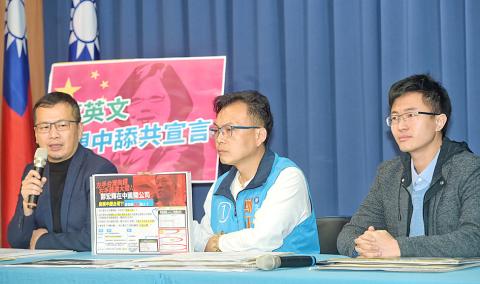President Tsai Ing-wen (蔡英文) is “pro-China and sucking up to the Chinese Communist Party [CCP],” Chinese Nationalist Party (KMT) legislative candidate Cheng Cheng-chien (鄭正鈐), KMT Taipei City Councilor Lo Chih-chiang (羅智強) and New Party Taipei City Councilor Hou Han-ting (侯漢廷) said yesterday.
Cheng, who is running for Hsinchu City’s legislative seat, told a news conference at KMT headquarters in Taipei that he, Lo and Hou have been labeled as “pro-China” by members of the Democratic Progressive Party (DPP).
The DPP has applied a double standard to stigmatize them, as some DPP members’ actions should be viewed as pro-China, he said.

Photo: Chang Chia-ming, Taipei Times
DPP legislative candidate Cheng Hung-huei (鄭宏輝), who is also running for the Hsinchu seat, set up a company in China and used the location “Taiwan, China” when he registered it, but his election campaign flags use the slogan “Protect Taiwan,” he added.
“Cheng Hung-huei can use the term ‘Taiwan, China,’ but continues to label people in other political camps as ‘red,’” Lo said. “Is this what the DPP’s ‘Taiwanese values’ really means?”
“Taiwanese only have one option: ‘one China’ in the future,” Lo said, repeating the sentence twice.
Tsai has also made three remarks that should be considered “pro-China and sucking up to the CCP,” he said, citing the president as having said years ago that “‘one China’ in the future is our only option,” “I am Taiwanese and also Chinese” and “the ‘1992 consensus’ means the Republic of China in Taiwan and the People’s Republic of China on the mainland.”
Lo urged Cheng Hung-huei and Tsai to explain whether the DPP can accept their behavior and remarks.
In May 2015, then-DPP spokesman Cheng Yun-peng (鄭運鵬) clarified that the “‘one China’ in the future is our only option” statement was made by former president Chen Shui-bian (陳水扁), who in his 2000 inaugural address said: “Under the existing foundation, the nation should create conditions for cooperation out of goodwill to make a concerted effort to solve the ‘one China’ problem in the future.”
In addition to accusations against Cheng Hung-huei of land speculation by the KMT and the New Power Party, Hou yesterday said they suspect that his proposal to extend the Wugu-Yangmei overpass (五楊高架橋) to Miaoli County’s Toufen Township (頭份) is for his personal benefit.
Cheng Hung-huei in 2016 bought two plots of land in Hsinchu and Miaoli that are close to the proposed route for the extension, Hou said, questioning whether that is a coincidence or part of a greater scheme.
Former Taipei County commissioner Chou Hsi-wei (周錫瑋), deputy director-general of Kaohsiung Mayor Han Kuo-yu’s (韓國瑜) presidential campaign headquarters, told the news conference that the KMT has received more than 5,000 reports about online posts intended to smear Han.
Why has the Tsai administration not acted on those posts, he asked.
Tsai is using the state apparatus to bully people and limit their freedom of expression by asking national security agencies and prosecutors to investigate people who question her government’s policies or have expressed support for Han, Chou said.
YouTuber Chen Pin-hung (陳品宏) said that many older people are worried and scared that they will be investigated if they post remarks in support of Han online.
Liao Zhi-cheng (廖志成), an administrator of Chou’s fan page on Facebook, said that many Han supporters’ comments on the platform have been marked as spam and deleted, while some accounts have been suspended.
However, comments by Tsai supporters have not been dealt with, so perhaps the social network is only regulating pan-blue supporters, Liao added.

The Ministry of Education (MOE) is to launch a new program to encourage international students to stay in Taiwan and explore job opportunities here after graduation, Deputy Minister of Education Yeh Ping-cheng (葉丙成) said on Friday. The government would provide full scholarships for international students to further their studies for two years in Taiwan, so those who want to pursue a master’s degree can consider applying for the program, he said. The fields included are science, technology, engineering, mathematics, semiconductors and finance, Yeh added. The program, called “Intense 2+2,” would also assist international students who completed the two years of further studies in

Former president Tsai Ing-wen (蔡英文) departed for Europe on Friday night, with planned stops in Lithuania and Denmark. Tsai arrived at Taiwan Taoyuan International Airport on Friday night, but did not speak to reporters before departing. Tsai wrote on social media later that the purpose of the trip was to reaffirm the commitment of Taiwanese to working with democratic allies to promote regional security and stability, upholding freedom and democracy, and defending their homeland. She also expressed hope that through joint efforts, Taiwan and Europe would continue to be partners building up economic resilience on the global stage. The former president was to first

The brilliant blue waters, thick foliage and bucolic atmosphere on this seemingly idyllic archipelago deep in the Pacific Ocean belie the key role it now plays in a titanic geopolitical struggle. Palau is again on the front line as China, and the US and its allies prepare their forces in an intensifying contest for control over the Asia-Pacific region. The democratic nation of just 17,000 people hosts US-controlled airstrips and soon-to-be-completed radar installations that the US military describes as “critical” to monitoring vast swathes of water and airspace. It is also a key piece of the second island chain, a string of

Taiwan will now have four additional national holidays after the Legislative Yuan passed an amendment today, which also made Labor Day a national holiday for all sectors. The Chinese Nationalist Party (KMT) and Taiwan People’s Party (TPP) used their majority in the Legislative Yuan to pass the amendment to the Act on Implementing Memorial Days and State Holidays (紀念日及節日實施辦法), which the parties jointly proposed, in its third and final reading today. The legislature passed the bill to amend the act, which is currently enforced administratively, raising it to the legal level. The new legislation recognizes Confucius’ birthday on Sept. 28, the